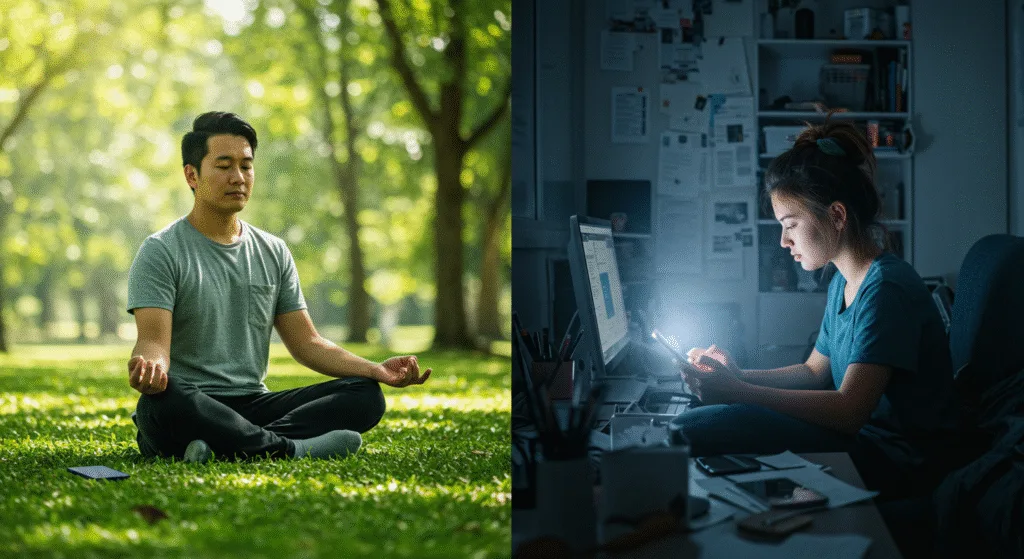Social media can both positively and negatively impact mental health. This article explores how platforms like Instagram, Facebook, and z influence anxiety, depression, self-esteem, and sleep patterns in users of all ages.
Introduction: The Dual Nature of Social Media
The effects of social media on mental health have become a widely discussed topic as digital platforms continue to shape daily interactions and perceptions. While social media has made communication easier and created new opportunities for support and learning, its overuse or misuse has also been linked to various mental health issues.
Millions of people around the world spend hours each day scrolling through feeds on platforms such as Facebook, Instagram, Twitter, and TikTok. These behaviors are often influenced by algorithms designed to maximize engagement, which can result in increased screen time and emotional exposure to both positive and negative content.
🧑🔬 How Social Media Affects Mental Health
1. Increased Risk of Anxiety and Depression
Studies have shown that prolonged exposure to social media can contribute to symptoms of anxiety and depression. Passive consumption—such as endlessly scrolling without active interaction—can lead to feelings of inadequacy and loneliness. Users may compare their lives with the idealized versions presented by others, resulting in lowered self-esteem.
In particular, younger users, especially teenagers, are more vulnerable to these comparisons. The constant need for validation through likes and comments can create performance pressure and fear of missing out (FOMO), further exacerbating stress levels.
2. Cyberbullying and Its Psychological Consequences
Online harassment is another significant concern. Bullying that occurs on social platforms can be relentless and public, making it difficult for victims to escape. The anonymity provided by the internet sometimes encourages harmful behavior, and the psychological damage can be long-lasting.
Victims of cyberbullying are at higher risk for depression, anxiety disorders, and even suicidal thoughts. Schools and parents are increasingly recognizing the importance of monitoring online activity and providing support systems for affected individuals.
3. Sleep Disruption and Fatigue
Excessive use of social media, particularly before bedtime, has been associated with poor sleep quality. The blue light emitted by screens interferes with melatonin production, disrupting circadian rhythms. Additionally, emotionally charged content can keep the mind alert, making it harder to fall asleep.
This lack of restful sleep can then feed into a cycle of mood swings, irritability, and decreased cognitive function, affecting both personal and academic performance.

💬 Positive Impacts of Social Media
Despite the risks, social media is not inherently harmful. When used responsibly, it can provide several benefits to mental health:
- Support Communities : Many users find comfort in online groups focused on mental health recovery, chronic illness, or shared life experiences.
- Awareness Campaigns : Platforms have been instrumental in spreading awareness about mental health issues and reducing stigma.
- Access to Resources : Therapy apps, crisis hotlines, and mental health professionals are increasingly available through digital channels.
These tools can offer immediate help to those who might otherwise feel isolated or unable to seek assistance.
🧠 Who Is Most Affected?v
Certain demographics are more susceptible to the negative effects of social media:
- Teenagers and Adolescents : Their brains are still developing, and they are highly impressionable.
- Individuals with Pre-existing Mental Conditions : Those already dealing with anxiety or depression may find their symptoms worsened by online negativity.
- Frequent Users : Spending more than three hours per day on social platforms has been correlated with poorer mental health outcomes.
Gender differences have also been observed, with some studies indicating that teenage girls may be more impacted by body image concerns linked to filtered images and beauty standards promoted online.
⚖️ Finding Balance: Healthy Social Media Use
To minimize harm while enjoying the benefits, users should consider adopting healthier habits:
- Set time limits using built-in screen-time features.
- Follow accounts that promote positivity and authenticity.
- Take regular digital detoxes.
- Be mindful of emotional reactions to content.
- Prioritize real-life relationships over virtual connections.
Parents and educators can play a role by teaching digital literacy and encouraging open conversations about online experiences.
🧾 Conclusion
The effects of social media on mental health are complex and multifaceted. While platforms offer valuable tools for connection and education, they also pose risks when used excessively or passively. Awareness, moderation, and responsible usage are key to maintaining a healthy relationship with digital spaces.
Understanding how social media influences emotions and behaviors allows users to make informed choices that support mental well-being. As research continues to evolve, so too must our approach to navigating this powerful aspect of modern life.
Read This Article: Depression Risk Factors ! When to Seek Help
